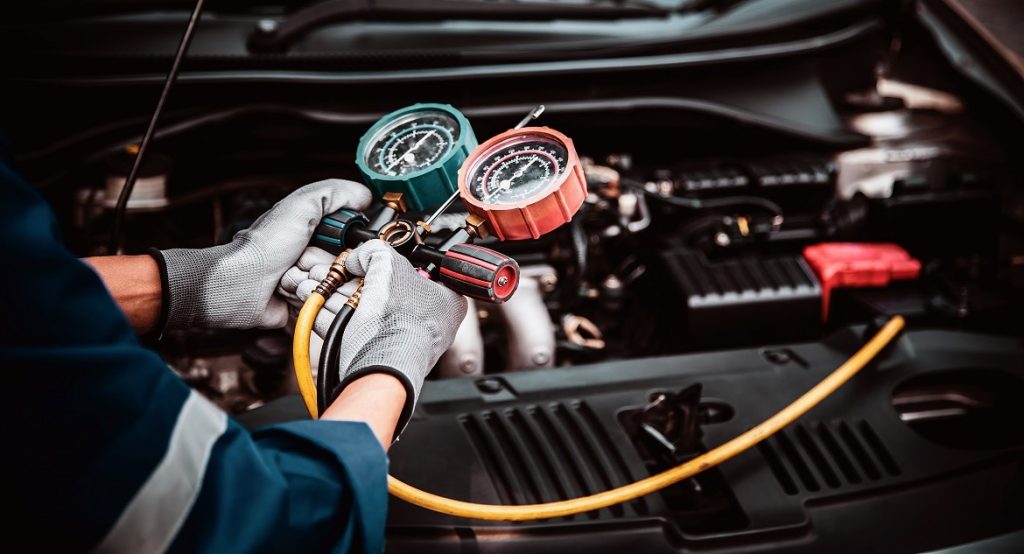When summer rolls around and you crank on your AC, one thing’s for sure: you want that icy blast to hit your face immediately. But what if it doesn’t? That’s where finding car ac repair near me becomes a lifesaver. You want someone who can fix, service, and restore your system so you don’t melt behind the wheel. In this guide, we’ll walk through every aspect—from what causes AC issues to how to choose the best local expert—written in an easygoing, conversational tone so you feel like you’re chatting with a trusted friend.
You’ll learn:
- How AC systems work in your car
- Common problems and what to check
- How to find the right “car ac repair near me”
- What repair shops will do—and how much it may cost
- Maintenance tips to keep things running smoothly
Let’s get started.
How Car AC Systems Work and Why They Fail
Your car’s AC system might seem like magic, but it’s actually a blend of chemistry, mechanical parts, and controls. At its heart is refrigerant—the stuff that cools the air. The refrigerant travels through hoses and tubes, gets compressed, then releases heat outside before turning cold again inside. It’s an elegant cycle of phases and pressures.
But because this system involves various parts—compressor, condenser, evaporator, blower fan, dryer, expansion valve—there are many ways things can go wrong. Leaks, worn seals, electrical faults, clogged filters, or simple wear and tear can slow it down or stop it entirely. When it does, you search for car ac repair near me, hoping for fast relief. And understanding the root of issues helps you ask smarter questions when talking to your mechanic.
Signs Your AC Needs Immediate Attention
When you search for car ac repair near me, it usually means one of these symptoms popped up:
- Warm air blowing instead of cold.
- Weak airflow even when the fan’s on high.
- Strange noises – rattles, hisses, or squeals from under the hood.
- Unpleasant smells – musty or like mildew.
- Visible leaks, oily spots under your car or around AC lines.
- Dashboard warning lights, indicating system malfunction.
If you notice any of these, it’s time to call in an expert who knows exactly how to diagnose and fix your vehicle’s issue. We’ll cover what a good local technician will do shortly—but first, let’s go deeper into the signs.
Warm or Lukewarm Air from Vents
If your AC isn’t chilling like it used to, it may indicate low refrigerant. That usually stems from a small leak—tiny and hard to spot. Technicians typically use a dye or electronic detector to locate the issue. The search for car ac repair near me often starts with this scenario, especially in older cars.
Weak Airflow Despite High Fan Setting
Low airflow usually means clogged cabin filter or failing blower motor. But reduced refrigerant pressure can also affect airflow. A good repair shop should check both airflow and refrigerant levels and explain to you what they find.
Strange Noises When AC is On
Hissing often signals a refrigerant leak. A squeal or belt noise points toward the compressor clutch or serpentine belt slipping. A rattle could be debris in the condenser or a failing compressor bearing. A proper car ac repair near me provider should isolate the sound and explain exactly what part is failing.
Musty or Sweet Smell from Vents
A musty odor often comes from mold buildup in the evaporator core—moist and dark, it’s a breeding ground for bacteria. Sweeter smells hint at oil mixed with refrigerant escaping. You don’t want that circulating around you—find a repair pro who thoroughly inspects for leaks and cleans your vents.
Visible Leaks or Wet Puddles
If you see oily wet spots under your vehicle, refrigerant mixed with oil likely escaped. A qualified technician fixes that leak, evac-•vents or recharges refrigerant, and tests the system for further problems. It’s one of the clearest reasons people search for car ac repair near me.
Dashboard AC Warnings
Some modern cars feature AC diagnostics and fault lights. If you see one, it’s usually time to connect a scanner, read codes, and determine which component isn’t working properly. The choice of AC tech matters—you want someone who understands those systems and can interpret trouble codes.
What Happens During a Typical “Car AC Repair Near Me” Visit
When you choose a local AC expert, here’s what a knowledgeable technician will do:
- Initial Interview – You describe what you experience: warm air, smells, noises, etc.
- Visual Inspection – Hoses, compressor belt, belts, wiring, filters.
- Refrigerant Pressure Test – Checking high and low-side pressures.
- Leak Check – UV dye, electronic detector, or bubble test.
- Airflow and Cooling Test – Temperature measurements, airflow volume check.
- Electrical Test – Compressor clutch power, clutch cycling, HVAC control voltages.
- Part Replacement or Repair – Seals, hoses, dryer, expansion valve, condensers, evaporators, compressors.
- System Evacuation and Recharge – Vacuuming out old refrigerant, recharging with specified quantity.
- Performance Test – Ensuring cooling is back to specs and all sounds/noises are gone.
- Clean & Preventive Maintenance – Cabin filter change, evaporator disinfection, belt tension.
Don’t be afraid to ask how many of these steps they follow—an expert provider will walk you through each one. This is what makes car ac repair near me truly effective.
Finding the Right “Car AC Repair Near Me” Expert
Searching for “car ac repair near me” returns scores of shops. How do you pick the right one?
Check Credentials and Certifications
- Look for ASE (Automotive Service Excellence) certifications.
- Shops certified as AC technicians (e.g. EPA Section 609) can handle refrigerants safely.
- Carrier or OEM certifications—dealership training is a bonus.
- Experience with your specific car brand or HVAC system.
Ask About Warranty and Guarantee
Refrigerant leaks often recur without proper repair. Top shops back their work with at least a 12-month warranty on parts and labor. Some even offer leak-free guarantees for a limited time.
Read Local Reviews and Get Recommendations
Look at Google, Yelp, Facebook, and ask friends or coworkers. A shop with consistently positive feedback on AC repairs is a safe bet. They should be responsive to questions and stand behind repairs.
Prefer Specialists or Dealers
Independent AC specialists often focus solely on AC repairs and may be more affordable than dealerships. Dealers may charge more but can have OEM parts and detailed history on your car brand. Both have pros; choose what suits your needs.
Inquire About Transparent Pricing
A reliable shop will give you an estimate of:
- Diagnostic fees
- Parts
- Labor hours
- Refrigerant recharge cost
- Tax
They should also explain if a high-pressure retrofit or extra services are needed.
Convenient Location and Availability
When you search for “car ac repair near me,” check shop hours and whether they offer appointment flexibility, loaner cars, or mobile service. Faster service especially matters in peak summer months.
Breakdown of Common AC Service Procedures and Costs
Here’s a breakdown of typical AC services—prices can vary widely, so treat these as ballpark estimates:
AC System Diagnostics (~ $80–$150)
- Technician connects gauges, inspects belts, hoses, compressor.
- May use UV dye or electronic sniffer.
- Technician explains what’s wrong and why.
Refrigerant Recharge (~ $120–$250)
- Vacuum system, recharge with proper type/amount.
- Test cooling performance.
- Includes cleanup of old refrigerant.
Leak Repair (~ $150–$500+)
- Seal replacements, hose repairs, condenser/evaporator fixes.
- Dye injection, leak sealing.
- Price depends on location and component.
Compressor Replacement (~ $400–$1,200+)
- Typically comes as a “comprehensive AC compressor kit.”
- Includes dryer, orifice tube, seals.
- Labor-intensive. Often done with refrigerant evacuation and recharge.
Condenser/Evaporator Repair (~ $300–$1,000+)
- Condenser often located behind grille—prone to damage.
- Evaporator sits under dash—often requires disassembly.
- Labor dominates cost.
Cabin Air Filter Replacement (~ $20–$60)
- Low-cost DIY item.
- Restores airflow and helps prevent mold.
HVAC Cleaning or Mold Treatment (~ $80–$150)
- Disinfect evaporator, vents.
- Eliminates odors and allergens.
Affordable approach: often starts with diagnostics and recharge.
Higher-cost repairs: complex leaks or failed compressors.
Why a Proper Fix Beats DIY Recharge
It’s tempting to pick up a refrigerant recharge kit from the parts store. But there are good reasons to avoid it:
- DIY kits often contain R‑12 substitute, not factory-spec refrigerant.
- They don’t fix actual leaks; any existing leak will continue.
- Overcharging or undercharging can harm your compressor.
- No guarantee, skills, tools, or knowledge—warranty is non-existent.
- You risk using improper refrigerant, which may damage the system long-term.
A good professional follows manufacturer specs, backs their work, and gives you peace of mind. Your search for car ac repair near me should lead you to a trained expert, not a half-measure quick fix.
Preventative Maintenance to Avoid AC Breakdowns
A little care goes a long way. Here’s how to keep your AC system healthy:
Keep the Cabin Air Filter Clean
Check it every 12 months. A dirty filter chokes airflow and causes ice buildup. Good techs may include this in routine service.
Run the AC Year‑Round
Turning on your AC for a few minutes each month—even in winter—helps circulate dye, keep seals lubricated, and prevent clogs. It avoids stale smells too.
Inspect Belts and Hoses
At annual service intervals, check belts for cracks or fraying. Hoses should be free of bulges or leaks. A quick visual check during your oil change can catch wear early.
Clean the Condenser Fins
Insect debris or mud can block airflow. Spray the condenser gently with low‑pressure water to remove buildup. Some shops will do this as part of a recharge service.
Watch for Changes in Performance
Warm air, noises, or smells? Don’t wait. Search “car ac repair near me” early to prevent escalation.
Use a Professional Every Few Years
Even if your system seems fine, a professional diagnostic every two to three years can catch small issues. In regions with long, hot summers, annual checks are probably better.
Environmental & Regulatory Considerations
Refrigerants like R‑134a and newer R‑1234yf are greenhouse gases. They’re regulated substances under EPA’s rules. In many countries (including the U.S.), only licensed technicians can handle them. That’s another reason to choose trained pros, not roadside recharge cans.
Proper recovery and disposal are required. Good shops use equipment that recovers refrigerant, prevents fugitive emissions, and maintains system specs. This protects your system, widens your warranty support, and avoids environmental fines.
Frequently Asked Questions (FAQs)
How long does an AC recharge take?
A typical recharge plus inspection takes about 1–2 hours, depending on workload.
Can I drive with a small refrigerant leak?
Technically yes, but you’ll reduce cooling efficiency and risk compressor overheating and damage. It’s better to address it soon after noticing symptoms.
What’s the life expectancy of a car AC compressor?
With proper care, a compressor can last 10–15 years or 200,000 miles. But low refrigerant or dirty systems shorten that.
Is it normal for AC to smell moldy after sitting?
Yes—moisture in the evaporator fosters mold growth. A licensed AC shop can clean the core and vents, eliminating the smell.
How much refrigerant does my car need?
Each car has a spec listed on a label under the hood. It can range from 1–3 pounds, depending on system size. Correct amount is key to performance and longevity.
Choosing Between Independent Shops vs. Dealerships
Independent AC Specialists
Pros:
- Often more affordable
- Fast turnaround
- Specialized services
Cons:
- May lack OEM parts
- Service quality varies by shop
Dealership Service Centers
Pros:
- Trained mechanics for your brand
- Genuine OEM parts
- Work record in vehicle history
Cons:
- Typically more expensive
- Slower turnaround if busier
Both options can be smart depending on your car, budget, and desired service level.
Final Thoughts on “Car AC Repair Near Me”
No one wants to search for car ac repair near me, but when the AC starts acting up, it’s time. Choose a certified, experienced, transparent professional. Understand the steps: diagnose, leak find/repair, evacuate/recharge, test, clean, and follow up.
Being proactive and maintaining your AC saves you bigger issues and more money down the road. Most importantly, it keeps your rides cool, safe, and comfortable—without any sweat or hassle.




